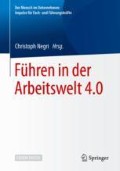Zusammenfassung
Die Arbeitswelt 4.0 konfrontiert uns mit einem disruptiven Wandel. Zeiten des Wandels sind immer auch Zeiten volatiler, unsicherer, komplexer und mehrdeutiger Entscheidungsumwelten. In solchen Zeiten ist die Fähigkeit smart zu entscheiden sowohl für Individuen wie auch für Organisationen eine Kernkompetenz. Nicht entscheiden ist nicht möglich und falsch entscheiden kann einschneidende Konsequenzen haben. Einschneidende Konsequenzen unvermeidbarer Entscheidungsfehler gilt es so gut wie möglich zu limitieren. Vermeidbare Entscheidungsfehler müssen minimiert werden. Die Kombination dieser zwei Aspekte ist die Essenz des smarten Entscheidens. Bessere Voraussetzungen für smarte Entscheidungen lassen sich sowohl auf individueller wie auch auf organisationaler Ebene schaffen, indem systematische Entscheidungsverzerrungen und negative Umwelteinflüsse bekannter werden und Konzepte wie Agilität, organisationale Lernfähigkeit oder Antifragilität weitere Verbreitung finden.
Access this chapter
Tax calculation will be finalised at checkout
Purchases are for personal use only
Change history
21 July 2021
Der zweite Absatz auf der Seite 174 wurde versehentlich mit einige Fehler veröffentlicht und wurde korrigiert.
Literatur
Baitsch, C., & Wetzel, R. (2008). Organisationale Lernfähigkeit gestalten – Ein Instrumentenvorschlag zur Analyse und Bewertung einer zentralen Unternehmensressource. OrganisationsEntwicklung, 2, 79–86.
Beck, K., Beedle, M., van Bennekum, A., Cockburn, A., Cunningham, M., Fowler, M., et al. (2001). Manifesto for agile software development. http://agilemanifesto.org/. Zugegriffen am 15.10.2018.
Cialdini, R. B. (2007). Influence: The psychology of persuasion (überarbeitete Auflage). New York: Collins Business.
Cialdini, R. B. (2016). Pre-suasion: A revolutionary way to influence and persuade. New York: Simon & Schuster.
Cialdini, R. B., & Trost, M. R. (1998). Social influence: Social norms, conformity and compliance. In D. T. Gilbert, S. T. Fiske & L. Gardner (Hrsg.), The handbook of social psychology (4. Aufl., S. 151–192). New York: McGraw-Hill.
Dawkins, R. (2016). The selfish gene (40th Anniv). New York: Oxford University Press.
Ernst, F., & Fischbacher, U. (2002). Why social preferences matter – The impact of non-selfish motives on competition, cooperation and incentives. The Economic Journal, 112(478), C1–C33.
Fliessbach, K., Weber, B., Trautner, P., Dohmen, T., Sunde, U., Elger, C. E., & Falk, A. (2007). Social comparison affects reward-related brain activity in the human ventral striatum. Science, 318(5854), 1305 LP-1308.
Friston, K. (2010). The free-energy principle: a unified brain theory? Nature Reviews Neuroscience, 11, 127.
Genner, S., Probst, L., Huber, R., Werkmann-Karcher, B., Gundrum, E., & Majkovic, A.-L. (2017). IAP Studie 2017. Der Mensch in der Arbeitswelt 4.0. Zürich. https://www.zhaw.ch/storage/psychologie/upload/iap/studie/IAP_STUDIE_2017_final.pdf. Zugegriffen am 15.10.2018.
Gigerenzer, G., & Gaissmaier, W. (2010). Heuristic decision making. Annual Review of Psychology, 62(1), 451–482.
Gigerenzer, G., Todd, P. M., & ABC Research Group. (1999). Simple heuristics that make us smart. New York: Oxford University Press.
Grawe, K. (2016). Unsere Grundbedürfnisse. https://www.klaus-grawe-institut.ch/blog/1205/. Zugegriffen am 15.10.2018.
Johnson, E. J., & Goldstein, D. (2003). Do defaults save lives? Science, 302(5649), 1338 LP-1339.
Kahneman, D. (2012). Thinking, fast and slow. London: Penguin Books Ltd.
Kahneman, D., & Tversky, A. (1979). Prospect theory: An analysis of decision under risk. Econometrica, 47(2), 263–291.
Kahneman, D., Knetsch, J. L., & Thaler, R. H. (1991). Anomalies: The endowment effect, loss aversion, and status quo bias. Journal of Economic Perspectives, 5(1), 193–206.
Lippmann, E., & Steiger, T. M. (2013). Handbuch Angewandte Psychologie für Führungskräfte – Führungskompetenz und Führungswissen (4. Aufl.). Berlin/Heidelberg/New York/Tokio: Springer.
Majkovic, A. -L., Werkmann-Karcher, B., Gundrum, E., Birrer, J., Genner, S., Probst, L., Huber, R., & Pfister, A. (2018). IAP Studie 2017 – Teil 2. Der Mensch in der Arbeitswelt 4.0. Ergebnisse der qualitativen Interviews. Zürich. https://www.zhaw.ch/storage/psychologie/upload/iap/studie/IAP-Studie_Teil-2_Bericht.pdf. Zugegriffen am 15.10.2018.
Ross, L. (1977). The intuitive psychologist and his shortcomings: Distortions in the attribution process. In L. Berkowitz (ed.), Advances in experimental social psychology (Bd. 10, S. 173–220). Orlando: Academic Press.
Simon, H. (1972). Theories of bounded rationality. In C. B. McGuire & R. Radner (Hrsg.), Decision and organization (S. 161–176). Amsterdam: North-Holland Publishing Company.
Sunstein, C. R., & Thaler, R. H. (2009). Nudge: Improving decisions about health, wealth and happiness. London: Penguin Books Ltd.
Taleb, N. N. (2012). Antifragile: Things that gain from disorder. New York: Random House.
Tversky, A., & Kahneman, D. (1974). Judgment under uncertainty: Heuristics and biases. Science, 185(4157), 1124–1131.
Tversky, A., & Kahneman, D. (1981). The framing of decisions and the psychology of choice. Science, 211(4481), 453 LP-458.
Tversky, A., & Kahneman, D. (1992). Advances in prospect theory: Cumulative representation of uncertainty. Journal of Risk and Uncertainty, 5(4), 297–323.
Varian, H. R. (2016). Grundzüge der Mikroökonomik (9. Aufl.). Berlin: de Gruyter.
Watzlawick, P., Beavin, J. H., & Jackson, D. D. (1967). Pragmatics of human communication: A study of interactional patterns, pathologies, and paradoxes. New York: W. W. Norton & Company.
Author information
Authors and Affiliations
Corresponding author
Editor information
Editors and Affiliations
Rights and permissions
Copyright information
© 2019 Springer-Verlag GmbH Deutschland, ein Teil von Springer Nature
About this chapter
Cite this chapter
Huber, R.E. (2019). Smart entscheiden in Zeiten der Veränderung. In: Negri, C. (eds) Führen in der Arbeitswelt 4.0. Der Mensch im Unternehmen: Impulse für Fach- und Führungskräfte. Springer, Berlin, Heidelberg. https://doi.org/10.1007/978-3-662-58411-8_13
Download citation
DOI: https://doi.org/10.1007/978-3-662-58411-8_13
Published:
Publisher Name: Springer, Berlin, Heidelberg
Print ISBN: 978-3-662-58410-1
Online ISBN: 978-3-662-58411-8
eBook Packages: Psychology (German Language)

